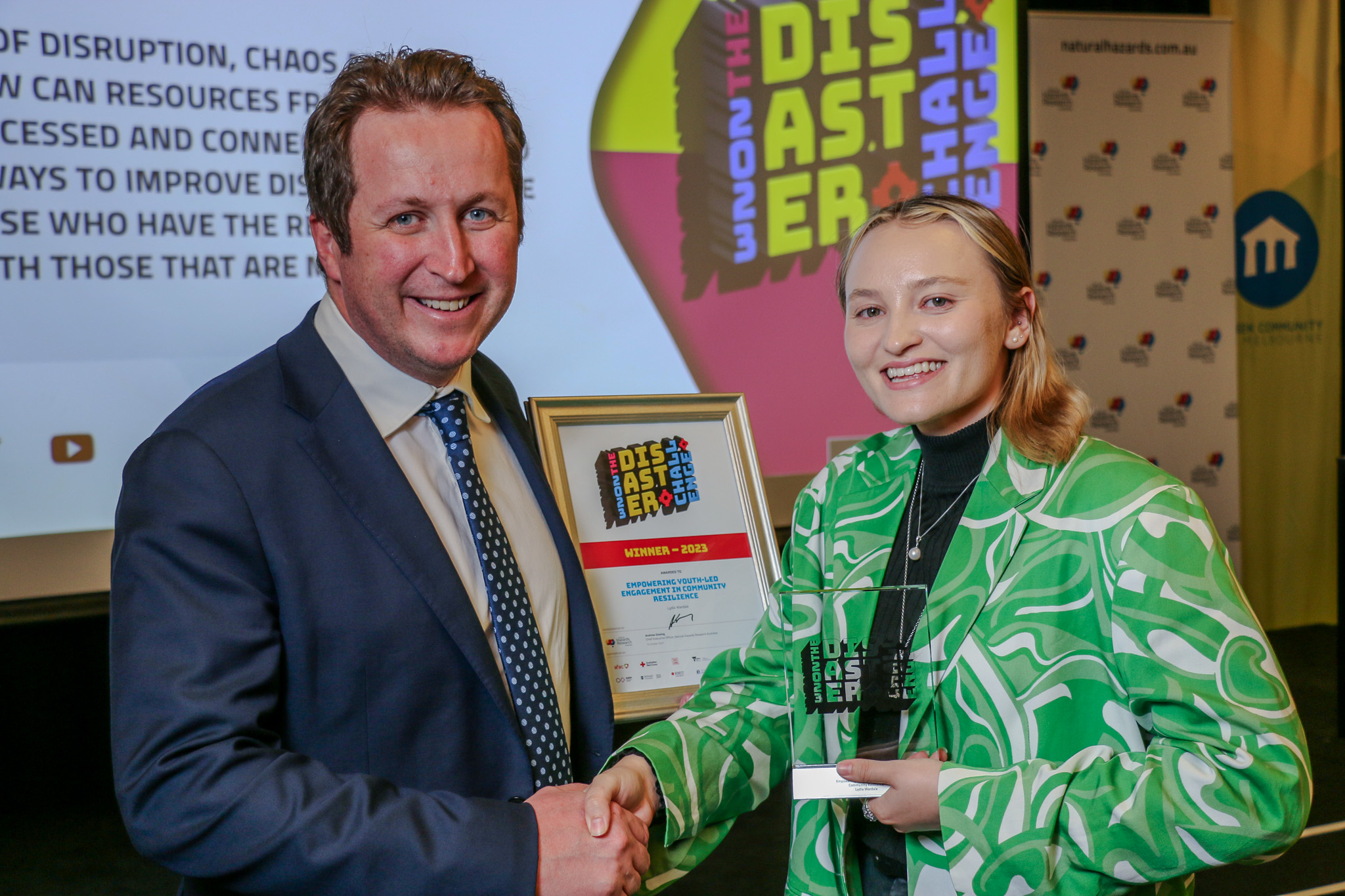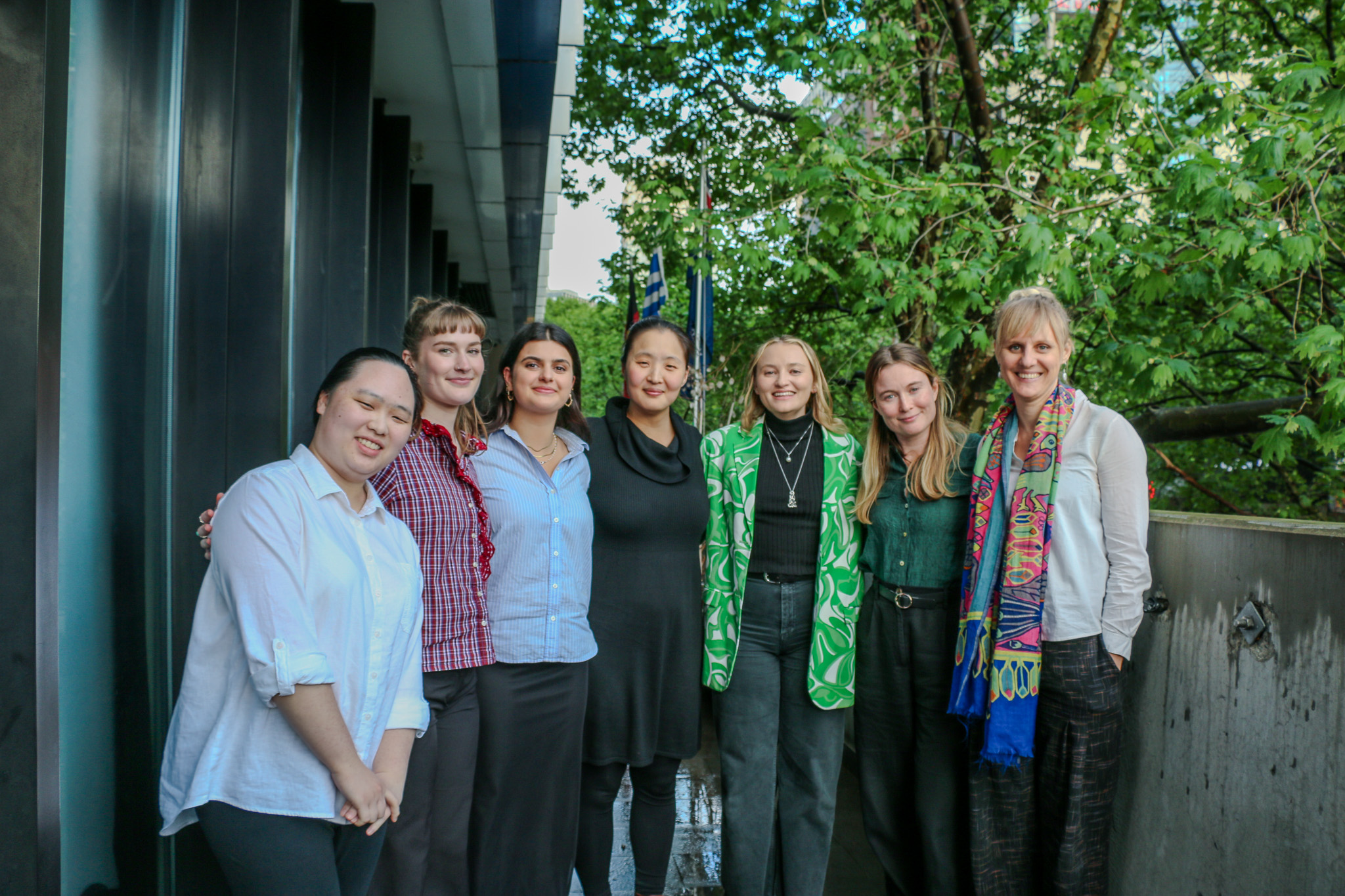
A concept for young people aged 13-18 to take a leading role in disaster resilience in their local area has taken out the 2023 Disaster Challenge, run by Natural Hazards Research Australia in Melbourne.
Youth Guardians is the winning concept by Lydia Wardale which addresses the wicked problem posed for the Disaster Challenge: In the midst of disruption, chaos and calamity, how can resources from across society be accessed and connected in new and innovative ways to improve disaster response and link those who have the resources and supports with those that are most in need?
“My solution to the wicked problem empowers teenagers to use their knowledge and experience,” said Lydia, a recent Masters graduate in development economics and public policy economics from the University of Queensland.
“Youth Guardians would be a youth-led engagement program for 13- to 18-year-olds to cultivate disaster resilience in their local area. Youth Guardians would provide youths with knowledge on disaster resilience and climate adaptation, while empowering them to connect and innovate in their communities, building on local strengths and tackling local challenges and adaptation for likely future emergencies.”
The idea would see teenagers complete core activities that will develop their knowledge and skills in climate adaptation and disaster resilience, build their network within their community and inspire them to innovate and strengthen connection and resources before a disaster in their area.
The inspiration behind the concept comes from Lydia’s own experience as a teenager during the 2011 Brisbane floods, where the family home was flooded.
“The flood in 2011 was very traumatic, but also an incredibly transformative experience for me,” explained Lydia, who is at the early stages of a career in disaster risk reduction.
“Looking back, I realised I was not empowered to make use of the networks and knowledge that I had as a teenager that was incredibly valuable. My concept of Youth Guardians would enable young people now, who may face a similar situation to what my friends and I faced, or who just want to better prepare their local community, to use their knowledge and experience to make a positive change in the world.”
Held on 12 October, the eve of the United Nations International Day for Disaster Risk Reduction, the Disaster Challenge invited early career researchers, undergraduate and postgraduate students to present solutions to the wicked problem.
Natural Hazards Research Australia CEO Andrew Gissing said that the Disaster Challenge was an important way to engage a diverse group of people with a lived experience of natural hazards.
“Transformational change is needed to equip Australia for the increasing natural hazard risk we face. Research is key to driving innovation and test ideas, and the Disaster Challenge saw three fantastic ideas presented, all of which are potential solutions to reducing our disaster risk,” Andrew said.
Natural Hazards Research Australia will now work with Lydia over the next 12 months to explore her concept further, which is explained in this short video.
Joint runners up in the Disaster Challenge were Maya Walton, Chloe O’Brien and Kathy Tran, undergraduate students from the University of Technology Sydney, and Dr Catherine Kim, Dr Kate Saunders, Dr Jess Hopf, Dr Richard Cottrell, Tace Stewart, Kaitlyn Brown and Dr Aiden Price, a team representing the Queensland University of Technology, Monash University, Oregon State University, the University of Tasmania and the University of Queensland.
Maya, Chloe and Kathy’s pitch was to increase disaster education in high school with a ‘Climate Day’ experience, involving virtual reality as an immersive educational experience help alleviate young people’s climate anxiety.
Catherine, Kate and Jess represented their broader team at the final and drew on their own experience of the 2022 flooding in Queensland to tackle the overwhelming amount of data available during an emergency with a concept for an app to give individuals insight into what flooding in their area will personally mean for them and their family.
Watch all three pitches on Natural Hazards Research Australia's YouTube Channel.
Winner: Youth Guardians - Lydia Wardale
Runner up: Climate Day - Maya Walton, Chloe O’Brien and Kathy Tran
The 2023 Disaster Challenge was coordinated by Natural Hazards Research Australia and hosted with support from universities and emergency management organisations in Victoria: the Australian Red Cross, AFAC, the Country Fire Authority, the Department of Energy, Environment and Climate Action Victoria, Emergency Management Victoria, Fire Rescue Victoria, the Inspector-General for Emergency Management Victoria, Monash University, RMIT University, the University of Melbourne and the Yarra Ranges Shire Council.
For interviews and further information contact Nathan Maddock, Communications Manager, Natural Hazards Research Australia. 0410 998 600, nathan.maddock@naturalhazards.com.au

Lydia Wardale (right) accepts the Disaster Challenge winner's trophy from Natural Hazards Research Australia CEO Andrew Gissing. Photo: Friedo Ligthart, Natural Hazards Research Australia.

Disaster Challenge 2023 finalists, from left, Kathy Tran, Chloe O'Brien, Maya Walton, Catherine Kim, Lydia Wardale, Kate Saunders and Jess Hopf. Photo: Friedo Ligthart, Natural Hazards Research Australia.
